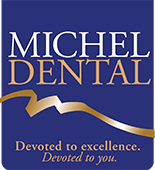Whole-mouth health keeps your whole body on track. Your Silver Lake, KS, dentist, Michael E. Michel DDS, takes care of your dental cleanings, exams, cosmetic procedures and restorations to ensure you look and feel your best.
What’s the point of a good-looking smile if your gums and bone structure are compromised? The best of modern general dentistry aims for whole-mouth health in an attractive smile that lasts a lifetime.
Michael E. Michel DDS PA, your Silver Lake family dentist, and his hard-working, friendly team aim for the best of modern general dentistry. From routine dental exams, x-rays and cleanings to cosmetic improvement with teeth whitening to TMJ and sleep apnea therapies, Michel Dental builds a healthy mouth for a healthy you.
The foundation of a great smile is regular dental care.
Daily brushing and flossing are critical to dental health, but your Silver Lake family dentist, Dr. Michel, also emphasizes the semi-annual oral exam and cleaning. Comfortable in Michel Dental’s bright and efficient atmosphere, patients get thorough check-ups that:
- look for tooth decay
- examine the health of gums and other soft tissues of the mouth with gentle periodontal probing
- assess jaw alignment and how teeth bite together
- visualize bone and root structure with periodic x-rays
- inspect hidden areas of the mouth with innovative intraoral camera imaging
Hygienic cleanings remove plaque and tartar from between teeth and at the gumline, avoiding the bacterial infections and gum disease that cause bone and tooth loss and impact other body systems. Prevention is a hallmark of care by your Silver Lake, KS, family dentist.
Dental problems are addressed with skill and compassion.
When dental issues arise, Dr. Michel’s extensive education, skill and experience can address them quickly and correctly. His restorative dental services include:
- tooth colored fillings
- natural-looking white crowns, onlays and inlays (partial crowns)
- endodontics or root canal therapy
- fixed bridgework
- periodontics ( root scaling and instillation with antibiotics)
In addition, Dr. MIchel offers innovative diagnostic testing and non-surgical treatment for TMJ (temporomandibular joint ) dysfunction and sleep apnea, both of which impact overall health. Quick and objective Joint Vibration Analysis detects any friction in teeth, jaw joints and muscles which cause classic jaw clicking, headaches and other symptoms of this jaw issue. For sleep apnea, Dr. Michel has the OASYS sleep device which helps eliminate the sleepless nights, interrupted breathing, snoring and systemic effects individuals can experience.
You can be confident in your smile, too.
Dr. Michel offers many outstanding cosmetic services for the healthy smile that just needs a little aesthetic improvement. These procedures include:
- Invisalign® clear braces for teens and adults
- teeth whitening for a noticeably brighter smile
- porcelain veneers to correct color, shape and size
You and your dentist in the Silver Lake community will discuss your goals for an outstanding, confident smile.
Get your oral health on track.
Best of all, this award-winning member of the Kansas Dental Association is committed to listening to and addressing the concerns of all his patients. He values continuing education for himself, his staff and for his patients, too.
Why not call Michel Dentist for a consultation? Great whole-mouth health can begin today! Phone (785) 273-7350. We serve adults and children in Silver Lake and Topeka, KS, as well as from the surrounding areas of Emporia, Lawrence and Manhattan.
